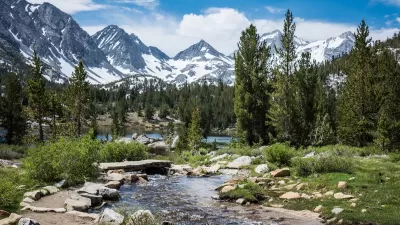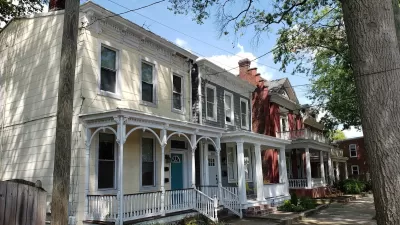We've covered a wide variety of ballot measures that appeared on the Nov. 4, 2014 ballot. While the media has focused greatly on Congressional and gubernatorial outcomes, we'll look at the results of the state and local measures we've covered here.
Of the ballot measures we covered, the Massachusetts voter initiative to roll back inflation-adjustment of the state gasoline excise tax was arguably the most important.
A decisive loss for sustainable gas tax funding—53 percent voting in support (to roll back indexing) and 47 percent opposed (retain indexing), reports WPRI. What does the vote to toss gas tax indexing portend for increasing state gas taxes? Read more in T4America, Governing, Politico Morning Transportation and Streetsblog.
Results on Louisiana, Maryland and Wisconsin Transportation Measures:
- Louisiana: WGNO reports: "Amendment No. 4 the Investment of Public Funds failed with 68 percent of voters saying no Tuesday. The amendment would have allowed the state to invest public money in an infrastructure bank for eligible transportation projects.
- Maryland: Ballotpedia notes that Question 1, "a legislatively-referred constitutional amendment, was approved. It provides for the establishment of a constitutionally-defined transportation trust fund and requires that revenues in the fund be used for paying transportation-related bond debt and for the construction and maintenance of highways."
- Wisconsin Ballotpedia reports: "Question 1, a legislatively-referred constitutional amendment, was approved. The measure required that revenue generated by transportation fees and taxes be deposited into the state's transportation fund. According to the amendment, none of the revenue collected from transportation-related levies could be appropriated to any program that is not directly administered by the Wisconsin Department of Transportation.
The Rhode Island Transit Measure to approve authorizing $35 million for Mass Transit Hub Infrastructure Bonds won with 60 percent of the vote, reports the Center for Transportation Excellence.
In Texas, where voters decided whether to allow oil and gas tax revenue to fund roads, Daniel C. Vock of Governing reports that "Proposition 1 passed overwhelmingly, with 80 percent of voters supporting the measure late Tuesday night."
A controversial conservation ballot in North Dakota was rejected, reports Vock.
Environmental groups spent nearly twice as much money as their opponents to set aside some oil revenue for protecting the land, but the ballot measure lost by a landslide.
In California, Governor Jerry Brown's signature $7.5 billion water bond won passage, reports the Sacramento Bee. "Voters were backing Proposition 1 by 67.5 percent to 32.5 percent with 35 percent of precincts reporting."
Moving on to local measures, a Seattle bus funding initiative was approved. "Originally conceived as a way to preserve bus service slated for cuts, then repackaged as a means to fund additional transit hours, the ballot measure was ahead 58.8 percent to 41.1 percent as of 8 p.m. on Tuesday," reports Crosscut.com. The initiative was devised after a King County bus funding initiative failed due to the high proportion of suburban voters.
In San Francisco, Ben Fried of Streetsblog reports that "voters reject (Measure L) to enshrine free parking and stop livable streets." 62 percent of voters rejected Measure L.
In California, three counties had oil drilling bans on the ballot. Ballotpedia reports that the "Santa Barbara County Fracking Ban Initiative was defeated."
However, voters in San Benito and Mendocino counties in California passed ballot measures to restrict fracking, as they did in Denton, Texas and Athens, Ohio, writes Timothy Cama in The Hill.
Look for forthcoming analysis on the outcome of the fracking ban measures as well as other election results.
FULL STORY: Important transportation ballot measures decided yesterday

Planetizen Federal Action Tracker
A weekly monitor of how Trump’s orders and actions are impacting planners and planning in America.

Congressman Proposes Bill to Rename DC Metro “Trump Train”
The Make Autorail Great Again Act would withhold federal funding to the system until the Washington Metropolitan Area Transit Authority (WMATA), rebrands as the Washington Metropolitan Authority for Greater Access (WMAGA).

The Simple Legislative Tool Transforming Vacant Downtowns
In California, Michigan and Georgia, an easy win is bringing dollars — and delight — back to city centers.

The States Losing Rural Delivery Rooms at an Alarming Pace
In some states, as few as 9% of rural hospitals still deliver babies. As a result, rising pre-term births, no adequate pre-term care and harrowing close calls are a growing reality.

The Small South Asian Republic Going all in on EVs
Thanks to one simple policy change less than five years ago, 65% of new cars in this Himalayan country are now electric.

DC Backpedals on Bike Lane Protection, Swaps Barriers for Paint
Citing aesthetic concerns, the city is removing the concrete barriers and flexposts that once separated Arizona Avenue cyclists from motor vehicles.
Urban Design for Planners 1: Software Tools
This six-course series explores essential urban design concepts using open source software and equips planners with the tools they need to participate fully in the urban design process.
Planning for Universal Design
Learn the tools for implementing Universal Design in planning regulations.
Smith Gee Studio
City of Charlotte
City of Camden Redevelopment Agency
City of Astoria
Transportation Research & Education Center (TREC) at Portland State University
US High Speed Rail Association
City of Camden Redevelopment Agency
Municipality of Princeton (NJ)





























